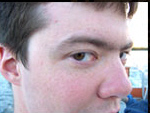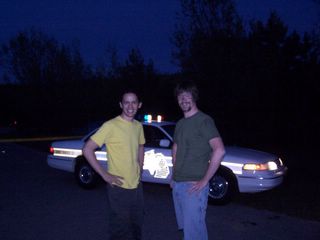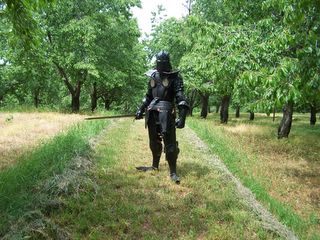
FS: Share with us your beginnings in the entertainment business.
AT: My formal beginning is actually the Folk Lore project. It all stems back to my best friend Jeff Morgan (Director and Writer of Folk Lore). In the spring of 2004 I had just graduated from Northern Michigan University with a bachelor's of science in psychology. I had planned (and still do) to take that degree to the doctorate level, but did not feel comfortable leaving my wife behind (I have been happily married since July 28th, 2001). She had recently changed her major to environmental engineering, and would need to stay at northern for another semester. This would require us to live apart for the two years I took to go to a grad school/ Ph.D program. We decided it was not emotionally or financially feasible for us to maintain two households and be apart for so long. This left me with some time on my hands, about 2 years worth to be exact..... Enter Jeff Morgan, recently returning from California to begin work on his first feature project. Jeff told me of his plans, at first only looking for feedback and ideas on the best ways to carry out his designs, but soon learned of my new found free time. I have always had a strong interest in movies, and the opportunity to become involved in the creation of one was to strong to pass up. Jeff and I began creating ideas that could be developed into features. We were mindful of what elements our story's could contain in budgetary sense, but really worked to make the most creative decision possible. In the end, Jeff developed about 4 ideas and I came up with one. All of the treatments varied from one another in a significant creative fashion. We had ideas ranging from the kidnapping and crime issues plaguing Mexico to the implications of a neural implants and brain mapping. So, to wrap up, I had no formal training in the industry at the beginning of my career. I started pursuing story telling because I wanted something meaningful to do well away from my studies. I really enjoy the path my life has taken, and plan to continue working on creating meaningful content for as long as I can.
FS: What motivates you day in and day out?
AT: My motivation is derived from my ambition to lead a meaningful life. I cannot be ensured that another life awaits me upon my death, and likewise, try to squeeze as much existence as I can out of every second. It's quite possible I would have grown into a "regular" guy, with a regular career, regular beliefs, and regular human apathy. Try not to laugh, but I had a life changing experience when I watched the movie "Fight Club". The messages found in that movie changed my perspective on life, and really helped solidify the belief that my life is what I make of it. If I am not happy with something that is going on, it is my responsibility to change it. Many people enjoy commenting on social inequalities, political misadventures, the human condition, and their fellow man, but are to apathetic to affect change in what they find offensive. The diffusion of responsibility is too much to overcome for many people, and it is my frustration with this that keeps me occupied. I chose psychology as my field of study because I wanted to understand the human condition. I wanted to learn about socialization and what makes people tick. I wanted to help people initiate change in their lives. Lately I have realized that this procedure may be ineffective, and it may be better to initiate change on the macro level. The modern motion picture is an incredibly powerful medium, and through entertainment it is possible to deliver a meaningful message to the populace.
FS: What is it about producing that satisfies you? What rewards do you take
from the process?
AT: Being a producer has been a tremendous learning experience. When I found out that Jeff was interested in having me produce his film, I was very excited. After that abated, I started asking around, what does a producer really do? The answer, I have discovered, is everything (especially on an independent production) Every aspect of physically getting the movie made falls to a producer (Jeff was a producer as well), as well as finding talent, lining up distribution, paying the bills, etc. I found the process to be very satisfying, as it is rare you can see your work bear fruit so quickly. For example, the opening scene of Folk Lore calls for a criminal investigation scene, complete with police officers, detectives, flashing lights, and a concerned crowd of bystanders. The typical Hollywood response is to just throw some money at the problem, but Folk Lore didn't have that option. We pounded the pavement, and were able to produce a police officer who was willing to drive his cruiser to the scene, put up crime tape, keep his lights flashing, and stand by his car. We called everyone we knew to come be concerned bystanders. We cast a very believable detective. The scene was a huge success, and the feeling of success in pulling that off was very comforting. Seeing my work come together with the work of others and make something beautiful is the reward I take away from the production process.

Jeff Morgan and Andrew Tomlinson in front of donated police car.
FS: You are located in Michigan. What kind of resources are available to you there and do you have any plans to move to Los Angeles?
AT: Jeff and I were both born and raised in Michigan, and we both really like it here. I am from the school of thought that the location doesn't matter, meaning that if you want to start a production company you don't need to move to L.A to be a success. Austin, Seattle, Vancouver, New Zealand, New York, all these places were able to create viable production areas without L.A. I don't think that Michigan has to be any different. The biggest downside to MI is access to professional talent, but the solution to that problem is so very easy. For the price of a plane ticket you can fly whoever you wish in, and that really levels the playing field. As far as the ability to make connections is concerned, if you are capable of making a quality product, the people will find you. The advantages to Michigan are numerous as well. First of all, it hasn't been shot to death. Most areas of Michigan don't have an infrastructure in place to charge for locations, so you don't need to run in fear of the police. The topography of the place is amazing, and due to the populations lack of negative experience with the independent film movement, people are very willing to help out and offer up locations with incredible production value.
FS: Tell us about your recent project, FOLK LORE and please provide us the nuts and bolts of what went into making this film.
AT: Folk Lore centers on the story of a father whose daughter is kidnapped and the quest he must embark on to get her back. Folk Lore focuses on the myths and legends that people have forgotten, as well what magic would look like if it still existed in today’s world. On a deeper emotional level, Folk Lore examines what happens when people do not value what is truly important, and how sometimes horrible events have to transpire for one to fully appreciate the blessings found in life. Folk Lore has been in some stage of development for about 2 years, and should be a finished project by the end of this month. News on Folk Lore can be found at http://www.prometheusmotionpictures.com/index.html. As soon as the FX work is completed, a trailer will be put up on the page, so check back in a few days! In addition to being the head producer, I was also the sound guy, co-fight choreographer, assistant editor, first AD, and DP assistant. I also filled a minor acting role in Folk Lore. Folk Lore was shot on 24p HD. We used the Sony HDCX300K in a unique workflow that Jeff created. Folk Lore was an entirely digital production, in that we captured right from the camera onto hard drives. This saved us all kinds of money, about 25k on the camera (no recording deck in it), no HD transfer deck, no conversions, and no lost time capturing the footage. In addition, by shooting this way we were able to edit and color correct with the native footage, which was (is) a huge advantage. The downside is we had to lug an Apple G5 with us everywhere we went, but at the end of the day, it was no worse than your typical video village and the savings were tremendous. Principal photography on Folk Lore went for 5 weeks, and pickups lasted another few weeks on a here and there basis. Folk Lore's budget is being termed "under one million" right now, as it looks like it was made for far more than was actually spent and we don't want to hamstring any of our distribution efforts.
FS: What was the biggest challenge with getting the project done?
AT: There were lots of big challenges, but the most stressful one was determining to go HD and then raising the money to buy the camera. Jeff and I quickly realized that it would be about the same price to rent an HD rig for 5 weeks as it would be to BUY one, so the choice was pretty obvious. We structured that decision into our budget and went through with our investor meetings. We were about 20k short 4 weeks out from the start of production. It did not look like we were going to be able to shoot HD, which was crushing. We wanted this project to go as far as it could, and HD seemed like the best way to make that happen. It's unlikely Folk Lore will see a theatrical release, but if it had that opportunity, it would be ready for a transfer and look beautiful on the big screen. As it turned out, Jeff and I were able to secure a business loan with which to buy the camera. This has been a great boon, as we spent a lot of time in pick-ups that we wouldn't have been able to afford with a rental and we now have a very professional camera for any future projects. We also decided to start renting it out to other indies at a very fair rate, a rate we would have jumped at had it been available. Information on that can be found by emailing me at Andrew@prometheusmotionpictures.com
FS: What are your plans with this project once it is done? Film Festivals? Distribution? Where will we be able to see it?
AT: As a rough cut, the project is being sent for review by a sales agent who will show it at the American Film Market. In addition, Folk Lore will be submitted to various festivals for more exposure, and should ultimately end up as in independent in your neighborhood rental place. When we set out to make Folk Lore, that was the market we expected to get into, and we were careful to make a marketable project our first time out. We wanted to (and did) make the best product we could, and I really believe it will have a future in the world. Folk Lore will have a Michigan premiere around the middle of October, and if picked up at AFM should be available for rent around February of 2006.

FS: What advice would you give to a young filmmaker preparing to shoot their first feature film?
AT: Set a date in stone when you will start shooting and stick with it come hell or high water. Don't let anything stop you. If you let things get in your way you will continually be held back. Nothing will ever be as perfect as you want it to be, and the longer you wait the farther your dream will get from you. Be creative, don't just throw money at a problem. You can almost always think your way out of a problem, be it a script re-write, finding a worthy alternative, researching, or turning to your friends for help. Keep a positive attitude and don't let the nay-sayers stop you. Don't be afraid to ask people for things, most people, when asked nicely, are thrilled to help and be involved. Try to plan everything out. The more you plan in pre-production the easier your time will be during production and post. Don't tell yourself you will fix a problem in post, because you probably won't. Think of a solution before you pack the gear up.
FS: What is on the horizon for you? What will you be doing next?
AT: I took 5 months off from "work" (I quit my job and am currently looking for another one now that post is mostly wrapped up), so my immediate plan is to find employment while I wait to see what happens with Folk Lore and it's distribution opportunities. I have about 4 treatments floating around right now for future projects (And I think Jeff has even more than that). Owning the camera equipment really helps in making future projects possible, and I'm really looking forward to what ends up happening with Folk Lore. I would like to try things from the director stand point the next time around, but will definitely try to include Jeff in whatever equation I come up with (That’s another secret, always try to work with talented people).





No comments:
Post a Comment